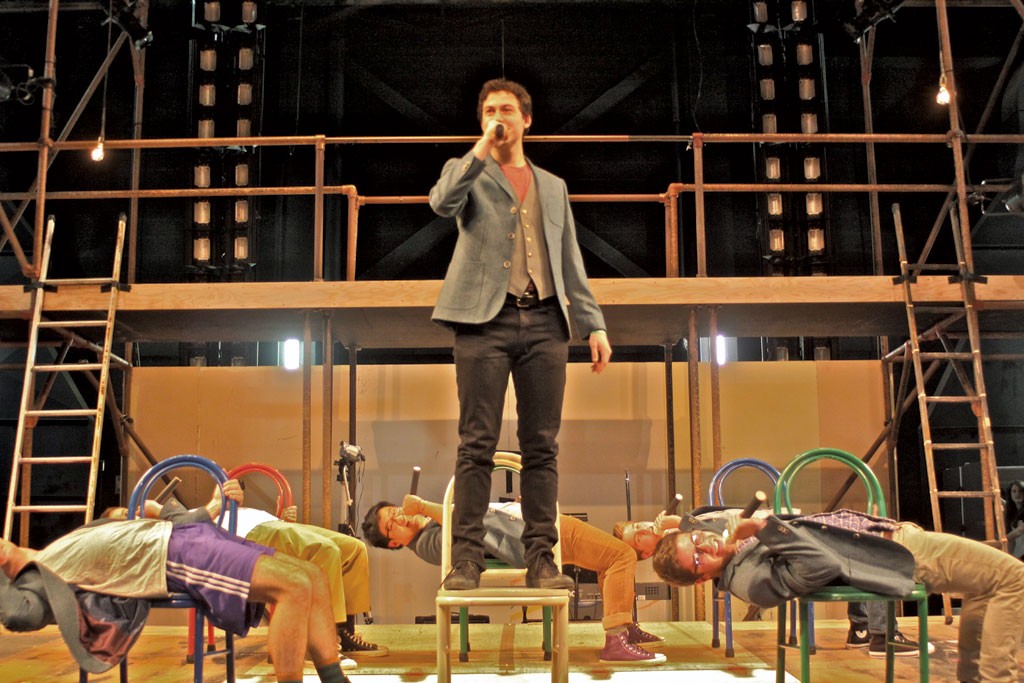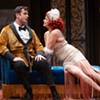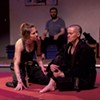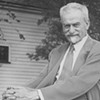
Ensemble in Spring Awakening
Published February 26, 2014 at 4:00 a.m.
Rock and roll is unequaled for expressing sex, dreams and youth. Authoritarian adults, especially the Victorian kind, excel at oppressing all of the above. Let the creative anachronisms begin: Spring Awakening superimposes rock music on Frank Wedekind's 1891 play exploring teenage sexual stirrings in the repressive atmosphere of the German bourgeoisie. The mix is risky, but taking chances helped Steven Sater (book and lyrics) and Duncan Sheik (music) win eight Tony Awards and a Grammy in the musical's 2006 Broadway premiere.
A Dartmouth Department of Theater production exploits the work's dazzling contrasts and showcases a talented student cast. In the two main roles, Max Gottschall and Daniel Calano are polished, powerful singers who are not only at home onstage but capable of tackling the show's complex themes. The entire cast is impressive, from the four students who play the grim and clueless adults to a large ensemble playing teenagers, who move nimbly from humor to rebelliousness to yearning.
It's a story of parents and teachers letting kids down at every chance. Wendla's mother is too inhibited to give her daughter a shred of sex education. With that combination of ignorance and innocence, Wendla (Haley Reicher) stumbles into pregnancy, but not before being overwhelmed with confusion about her feelings for school paragon Melchior (Gottschall). Wendla struggles with whether she wants to say no, and Melchior pushes past her resistance; her consent remains ambiguous.
The story of Moritz (Calano) is unadulterated woe. He's a so-so student and now so preoccupied with sexual fantasies he can't concentrate in school. The strict headmaster is keen to fail him, in keeping with the school's reputation for selectivity. For Moritz's father, his son's grades are a social embarrassment. The teen staggers under the weight of adult opprobrium and considers suicide.
The story arcs are sorrowful, but the musical has outbursts of joy and exhilarating defiance. Director Jamie Horton excels at staging for pace and energy, and fully exploits the bi-level set designed by Georgi Alexi-Meskhishvili. Horton is especially good at varying focus between the intimate and the big vista.
Horton does face the challenge of dramatizing — versus stylizing — moments of sexual fantasy, masochism, child sexual abuse and rape. Some choices are clever. A big nightgown allows for a hearty enactment of masturbation, and the contrast between polite, constrained movement and inner thoughts makes "The Word of Your Body" a dark duet about the richest contrast of all: love hurts. Horton also sometimes lets abstraction replace enactment, such as in the jagged projections that powerfully represent a character's recollection of childhood sexual abuse.
The intensity of "And Then There Were None" showcases the musical's strengths. Moritz can imagine no future now that he won't be promoted in school and has earned his father's disgust. His song is interlaced with Melchior's mother reading a letter in which she tries to console Moritz. While the letter offers fastidious, hollow comfort, the song lyrics convey adolescent frustration. The futility of communication rages in the contrast between a silky tune for the letter and the boiling intensity in Moritz's solo. The production wraps him in a cone of molten red light, and the number ends with him counting out "another day of utter shit, and then there were none."
Musicals have always used song to convey strong emotion, and Spring Awakening amplifies the convention. For many numbers, the actors whip out hand microphones to perform, rock-star style, for the audience. And once they can strut, scream and pose, rock and roll supplies the courage to open their hearts.
Sheik's score has the urgency of rock, slightly muzzled by pop's desire to entertain. The songs emphasize attitude more than storytelling. In this production, the tunes are a jumping-off point for musical director Joel Mercier's inventive scoring, which blends the precision of violin and viola with the dirty scrawl of rock bass and a contemplative cello with energetic jazz-rock guitar. The percussion hops nimbly among all the idioms, while the keyboards deliver mood and coherence. A stew of successful juxtapositions, the music supports a show that constantly plays with contrasts.
Costumes by Laurie Churba Kohn start with the rigid fashion of the late 19th century. The boys wear infantilizing knickers and not-grown-up school jackets; then Churba Kohn tosses in rebellious Chuck Taylor sneakers to underscore the production's taste for anachronism. The girls are ruffled and shiny, with skirt lengths that make them doll-like. The tension between child and teenager is nicely captured with clothing that tries, and fails, to tame them.
Dan Kotlowitz deals a full deck of lighting effects throughout the show. The peak comes in a thrilling cascade in the high-energy "Totally Fucked," a full-cast number that rings with an exhilarating response to adult authority.
The choreography, by Keith Coughlin, centers on the stomp. It's as violent a movement as you can make in dance, and allows the kids to express their anger. Their energy crackles and surges until the audience's feet are tapping, too.
Today, we're awash in validation of sexual desire, so the dark fears of a teenager may seem to belong to an earlier, unenlightened age. The fin-de-siècle setting of Spring Awakening seems overmatched, long vanquished. But historical repression is a clever metaphor for the doubt each teenager faces. Inside, each kid busting out of puberty asks dark and dangerous questions, hacking through the same fears, taboos and whispers that echoed in Victorian ears. And yet kids awaken, one by one.
INFO
Spring Awakening, based on the play by Frank Wedekind, book and lyrics by Steven Slater, music by Duncan Sheik, directed by Jamie Horton, produced by Dartmouth Department of Theater. Through March 2: Thursday through Saturday at 8 p.m., Sunday at 2 p.m., at Moore Theater, Hopkins Center for the Arts, Dartmouth College in Hanover, N.H. $10-15. hop.dartmouth.edu
More By This Author
Speaking of Theater, dartmouth College
-

Two Vermonters Awarded Prestigious Guggenheim Fellowships
Apr 15, 2024 -

Executive Director Kurt Thoma Leaves Barre Opera House
Mar 5, 2024 -

Ruth Bader Ginsburg Show Comes to the Flynn
Feb 25, 2024 -

Shows On Hold as Flooded Weston Playhouse Pumps Out Water
Jul 11, 2023 -

Experiential Theater With a Vermont Sensibility at ‘Marrowbone’
Oct 3, 2022 - More »
Comments
Comments are closed.
From 2014-2020, Seven Days allowed readers to comment on all stories posted on our website. While we've appreciated the suggestions and insights, right now Seven Days is prioritizing our core mission — producing high-quality, responsible local journalism — over moderating online debates between readers.
To criticize, correct or praise our reporting, please send us a letter to the editor or send us a tip. We’ll check it out and report the results.
Online comments may return when we have better tech tools for managing them. Thanks for reading.













































